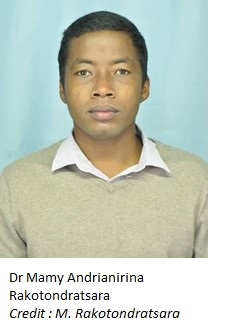In recent years, TDR has been responding to significant demand from African scientists for research training in French. Last year, the University of Sciences, Techniques and Technologies Bamako (USTTB) joined TDR’s Postgraduate Training Scheme as a new partner, following Cheikh Anta Diop University in Senegal, which joined the scheme in 2021. Cheikh Anta Diop University is also a Regional Training Centre, serving as a training hub that manages the dissemination of TDR’s portfolio of implementation research training courses.
Here we focus on two former TDR grantees who are now at the forefront of tackling two significant infectious diseases in Africa: schistosomiasis and malaria. We also hear from Dr Vic Arendt, Chair of TDR’s Joint Coordinating Board, who recently made a visit to Senegal.
Dr Oumy Kaltome Boh: From physician to district Chief Medical Officer

Dr Oumy Kaltome Boh, originally a physician from Senegal’s capital of Dakar, is currently Deputy Chief Medical Officer in the health district of Saint-Louis, Senegal. She has been interested in the burden of neglected tropical diseases (NTD) in her country since her formative years.
Faced with the impact of these diseases on the health of Senegal’s people, her main objective has been to tackle NTDs through the implementation of innovative interventions. It was for this reason that she chose to undertake a master's degree in management of health programmes at Cheikh Anta Diop University, as well as an international inter-university diploma in emerging infections.
Boh’s focus was schistosomiasis (also known as bilharzia), the second-most prevalent disease after malaria both in Senegal and much of the rest of sub-Saharan Africa. Benefiting from a TDR grant in 2020, Boh studied the day-to-day lifestyle practices and environmental factors that make schistosomiasis transmission more likely in endemic areas of her home country. As part of this study, done in collaboration with Senegal’s national NTD control programme, she also examined the effectiveness of praziquantel, the only treatment option currently available for schistosomiasis. Her study followed 287 children diagnosed with schistosomiasis over the course of three weeks after the administration of a single praziquantel dose.
Recruited to her current post by the Ministry of Health, she stresses that it was through the support of TDR’s Postgraduate Training Scheme that she acquired the skills needed to manage the district’s public health challenges. Learning about community-based approaches in particular allowed her to better understand the specific needs and problems of the district.
“With the help of TDR grants, students gain exposure to critical health programmes and learn to pool their skills to end the neglect of poverty-related diseases and to achieve the Sustainable Development Goals,” Boh said.
Dr Mamy Andrianirina Rakotondratsara: On a personal drive to tackle malaria
 Dr Mamy Andrianirina Rakotondratsara is a medical doctor and research technician for Madagascar's National Institute of Public and Community Health (INSPC). Originally from Madagascar, in East Africa, Rakotondratsara’s interest in research has been driven by a personal tragedy: he lost his older brother to malaria.
Dr Mamy Andrianirina Rakotondratsara is a medical doctor and research technician for Madagascar's National Institute of Public and Community Health (INSPC). Originally from Madagascar, in East Africa, Rakotondratsara’s interest in research has been driven by a personal tragedy: he lost his older brother to malaria.
Malaria has long been at the heart of public health efforts in Africa. The WHO African Region continues to carry a disproportionately high share of the global malaria burden. In 2021 the Region was home to about 95% of all malaria cases and 96% of deaths.
Thanks to TDR’s Postgraduate Training Scheme, Rakotondratsara completed TDR’s Massive Open Online Course on implementation research as part of his master’s in public health at Cheikh Anta Diop University in 2021. During the course, he designed a study around the relationship between the frequency of malaria episodes and mosquito bednet coverage, working with other researchers and doctors that specialize in malaria.
His research specifically targets the rural population of Madagascar’s Anosibe An’Ala district, and designing such a study has laid the foundations for Rakotondratsara to put implementation research into practice. He hopes to build upon this experience in his doctoral studies.Visit to Cheikh Anta Diop University by Chair of TDR’s Joint Coordinating Board
 Last year, Dr Vic Arendt, Chair of TDR’s Joint Coordinating Board, had the opportunity to visit the TDR-supported Regional Training Centre at Cheikh Anta Diop University. While there, he met with seven instructors and several master’s students supported by TDR. “I was impressed by the speed with which the centre has taken up TDR’s MOOC and other training modules into their programmes,” Dr Arendt said. “There is clearly significant demand for implementation research training in French-speaking West Africa.”
Last year, Dr Vic Arendt, Chair of TDR’s Joint Coordinating Board, had the opportunity to visit the TDR-supported Regional Training Centre at Cheikh Anta Diop University. While there, he met with seven instructors and several master’s students supported by TDR. “I was impressed by the speed with which the centre has taken up TDR’s MOOC and other training modules into their programmes,” Dr Arendt said. “There is clearly significant demand for implementation research training in French-speaking West Africa.”
In 2021, 46 master’s students (21 women and 25 men) were selected from a total of 1 682 applicants. The selected students hail from 17 countries in sub-Saharan Africa.
The University of Sciences, Techniques and Technologies Bamako is currently reviewing submissions from its open call for applications; the first cohort of French-speaking students from West and Central Africa will begin their studies later this year.For more information: Please contact Dr Mahnaz Vahedi.

